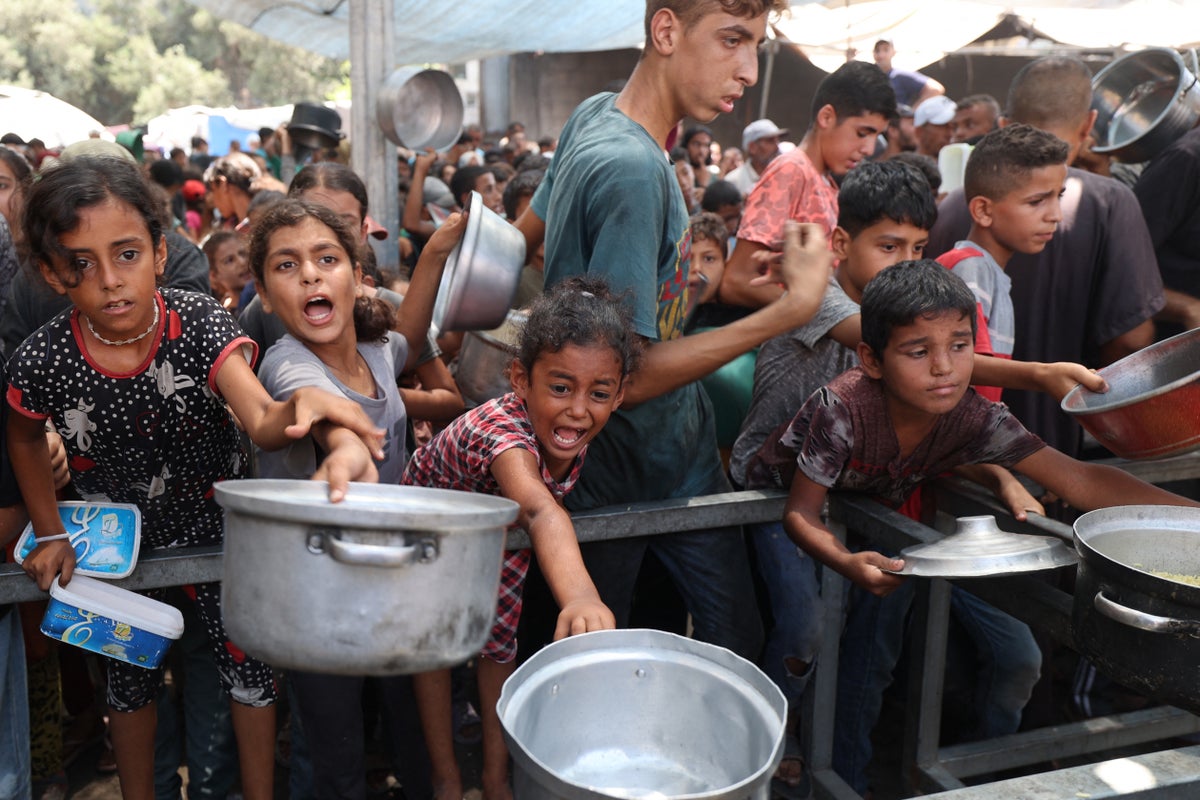A famine is officially unfolding in Gaza for the first time since the start of Israel’s two-year-long war against Hamas, according to the world’s leading monitor of hunger crises.
The declaration was made on Friday by the Integrated Food Security Phase Classification (IPC), the main global hunger monitor working with the UN and other aid agencies. The IPC warned in an interim statement in July that famine was imminent, but stopped short of making a declaration at the time.
The IPC said famine was occurring in the governorate of Gaza, which includes Gaza City and its surrounding towns, which is home to some 500,000 people. It is expected to spread to other areas including Deir al-Balah and Khan Younis by the end of September, the report warned, at which point more than one million people will be affected.
To declare a famine, the IPC dictates that at least 20 per cent of households must experience extreme food scarcity, 30 per cent of children must suffer from acute malnutrition, and two people per 10,000 must die daily from starvation.
“After 22 months of relentless conflict, over half a million people in the Gaza Strip are facing catastrophic conditions, characterised by starvation, destitution and death,” the IPC said.
This marks “the first time a famine has been officially confirmed in the Middle East region”, the IPC briefing said, although the region has suffered hunger crises historically.
Israel does not accept there is widespread malnutrition among Palestinians in Gaza and disputes the hunger fatality figures given by the health ministry in the Hamas-run Strip.
Israel began allowing more food into Gaza in July following a global outcry at pictures of emaciated children, though aid agencies say this still falls far short of the needs of the people living there. The Israeli military agency in charge of transferring aid to the territory rejected the IPC report on Friday, calling it “false and biased”.
Earlier this week the UN’s World Food Programme (WFP) also warned that nearly half a million Palestinians in Gaza were on the brink of famine and stressed for urgent need for a ceasefire to expand humanitarian aid.
The volume of aid reaching Gaza remains too small and distribution too chaotic to stop more people becoming malnourished, while those who are already starving or vulnerable are not getting life-saving supplements, three hunger experts and aid workers from six agencies told Reuters.
In the 22 months following the 7 October 2023 attacks by Hamas, 89 fatalities were attributed to malnutrition or starvation, mostly children under 18. In just the first 20 days of August, there were 133 deaths, including 25 under 18s, the Gaza health ministry said on Wednesday.
“We are seeing the worst possible humanitarian catastrophe that we can even measure,” said Jeanette Bailey, a child nutrition lead at the International Rescue Committee, a New York-based aid organisation.
There are “going to be a lot more children dying, a lot more pregnant and lactating women suffering from malnutrition”, she told Reuters.
Gaunt-looking Aisha Wahdan gave her eight-month-old son Hatem fortified milk from a bottle, saying that before coming to hospital she tried to wean him on wild plants such as carob, chamomile and thyme because she could not breastfeed. “There was no milk. I used natural herbs and tried everything because there was no milk substitute,” she said.
Some ordinary baby formula, needed for those whose mothers are dead or unable to breastfeed, or when the child is unwell, has entered Gaza since the aid blockade was loosened, UNICEF said on Tuesday. However, the agency said it only has stocks for 2,500 babies for a month and estimates that at least 10,000 babies need formula.
“Without consistent entry and distribution of items like specialised supplementary feeding items – high energy biscuits and fortified foods – we are watching a preventable crisis turn into a widespread nutrition emergency,” said Antoine Renard, Palestine country director of the WFP.
“At first it affects the most vulnerable groups but of course that will broaden,” he said.
COGAT, the Israeli military agency responsible for aid, said in a 12 August media statement that most deaths attributed to malnutrition by Palestinian health authorities were caused by other medical conditions. Malnutrition experts say deaths among people with existing health problems are typical in the early stages of a hunger crisis.
Israel has recognised shortages of food, but blames the United Nations for failing to effectively distribute supplies and Hamas for stealing it, which the groups deny. An official Israeli review found “no signs of a widespread malnutrition phenomenon among the population in Gaza”, COGAT said.
The famine declaration comes as Israeli prime minister Benjamin Netanyahu prepares to order the occupation of Gaza City, while also saying he wants to negotiate the release of the last remaining hostages held by Hamas after its 7 October attack on southern Israel, which killed around 1,200 people.
The Gaza health ministry said Thursday that at least 62,192 Palestinians have been killed in the war.

